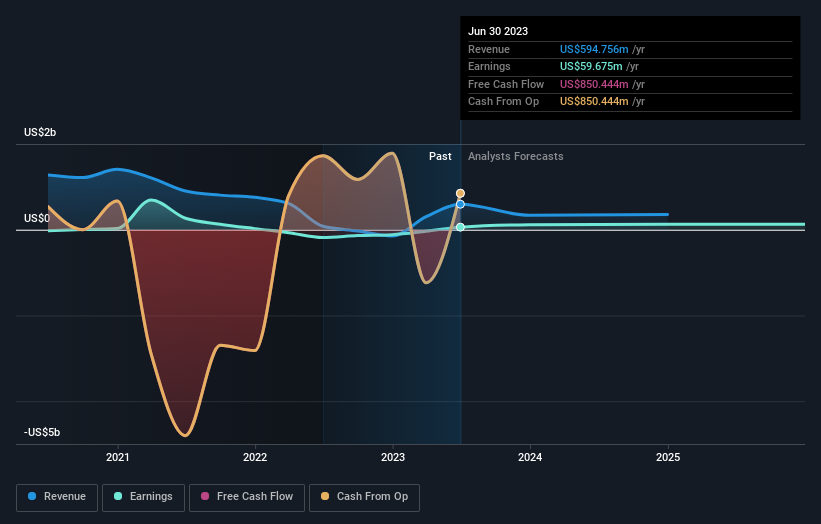- United States
- /
- Mortgage REITs
- /
- NYSE:PMT
PennyMac Mortgage Investment Trust's (NYSE:PMT) market cap decline of US$62m may not have as much of an impact on institutional owners after a year of 2.5% returns

Key Insights
- Significantly high institutional ownership implies PennyMac Mortgage Investment Trust's stock price is sensitive to their trading actions
- 50% of the business is held by the top 10 shareholders
- Recent purchases by insiders
To get a sense of who is truly in control of PennyMac Mortgage Investment Trust (NYSE:PMT), it is important to understand the ownership structure of the business. The group holding the most number of shares in the company, around 70% to be precise, is institutions. Put another way, the group faces the maximum upside potential (or downside risk).
Institutional investors endured the highest losses after the company's market cap fell by US$62m last week. However, the 2.5% one-year returns may have helped alleviate their overall losses. They should, however, be mindful of further losses in the future.
In the chart below, we zoom in on the different ownership groups of PennyMac Mortgage Investment Trust.
See our latest analysis for PennyMac Mortgage Investment Trust

What Does The Institutional Ownership Tell Us About PennyMac Mortgage Investment Trust?
Many institutions measure their performance against an index that approximates the local market. So they usually pay more attention to companies that are included in major indices.
We can see that PennyMac Mortgage Investment Trust does have institutional investors; and they hold a good portion of the company's stock. This implies the analysts working for those institutions have looked at the stock and they like it. But just like anyone else, they could be wrong. If multiple institutions change their view on a stock at the same time, you could see the share price drop fast. It's therefore worth looking at PennyMac Mortgage Investment Trust's earnings history below. Of course, the future is what really matters.

Investors should note that institutions actually own more than half the company, so they can collectively wield significant power. We note that hedge funds don't have a meaningful investment in PennyMac Mortgage Investment Trust. BlackRock, Inc. is currently the company's largest shareholder with 18% of shares outstanding. Meanwhile, the second and third largest shareholders, hold 12% and 7.2%, of the shares outstanding, respectively.
We also observed that the top 10 shareholders account for more than half of the share register, with a few smaller shareholders to balance the interests of the larger ones to a certain extent.
While studying institutional ownership for a company can add value to your research, it is also a good practice to research analyst recommendations to get a deeper understand of a stock's expected performance. Quite a few analysts cover the stock, so you could look into forecast growth quite easily.
Insider Ownership Of PennyMac Mortgage Investment Trust
The definition of company insiders can be subjective and does vary between jurisdictions. Our data reflects individual insiders, capturing board members at the very least. Company management run the business, but the CEO will answer to the board, even if he or she is a member of it.
Most consider insider ownership a positive because it can indicate the board is well aligned with other shareholders. However, on some occasions too much power is concentrated within this group.
Our most recent data indicates that insiders own less than 1% of PennyMac Mortgage Investment Trust. It has a market capitalization of just US$956m, and the board has only US$9.3m worth of shares in their own names. We generally like to see a board more invested. However it might be worth checking if those insiders have been buying.
General Public Ownership
The general public, who are usually individual investors, hold a 29% stake in PennyMac Mortgage Investment Trust. While this group can't necessarily call the shots, it can certainly have a real influence on how the company is run.
Next Steps:
It's always worth thinking about the different groups who own shares in a company. But to understand PennyMac Mortgage Investment Trust better, we need to consider many other factors. Like risks, for instance. Every company has them, and we've spotted 2 warning signs for PennyMac Mortgage Investment Trust (of which 1 is a bit unpleasant!) you should know about.
Ultimately the future is most important. You can access this free report on analyst forecasts for the company.
NB: Figures in this article are calculated using data from the last twelve months, which refer to the 12-month period ending on the last date of the month the financial statement is dated. This may not be consistent with full year annual report figures.
New: Manage All Your Stock Portfolios in One Place
We've created the ultimate portfolio companion for stock investors, and it's free.
• Connect an unlimited number of Portfolios and see your total in one currency
• Be alerted to new Warning Signs or Risks via email or mobile
• Track the Fair Value of your stocks
Have feedback on this article? Concerned about the content? Get in touch with us directly. Alternatively, email editorial-team (at) simplywallst.com.
This article by Simply Wall St is general in nature. We provide commentary based on historical data and analyst forecasts only using an unbiased methodology and our articles are not intended to be financial advice. It does not constitute a recommendation to buy or sell any stock, and does not take account of your objectives, or your financial situation. We aim to bring you long-term focused analysis driven by fundamental data. Note that our analysis may not factor in the latest price-sensitive company announcements or qualitative material. Simply Wall St has no position in any stocks mentioned.
About NYSE:PMT
PennyMac Mortgage Investment Trust
Through its subsidiary, primarily invests in residential mortgage-related assets in the United States.
Moderate with moderate growth potential.
Similar Companies
Market Insights
Community Narratives



